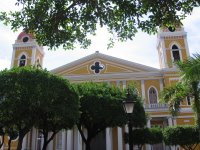There's something about being in another country that makes even the most ordinary aspects of life an adventure in themselves. Take driving, for example. Most of the time in the States, my brain went into cruise control for the commute to and from the office, shopping trips, and visits to friends' houses.
Not so in Managua. This week, I had my first opportunity to drive in the city, as I had to go to airport to meet Andrea (who arrived Saturday night). I was extremely nervous, as you might expect. Managua is a city the size of San Antonio and the roads, drivers, and signage are all much less predictable.
I was going to have to drive for my first time EVER in Friday rush hour traffic (to get the Jeep from the office to my house) until a coworker agreed to drive me and my friend Heather home after a meeting he had. This turned out to be a great alternative, as Friday afternoon is one of the worst possible times to drive here.
Saturday morning, Heather and I ventured out on our own, though, to run some errands near the center of town. One feature of driving here in Managua that is unique is rotundas (or roundabouts, if you like), but not your run of the mill rotundas. Oh, no. That would be too easy. These rotundas have traffic entering from all four sides from multiple lanes, and you have to pay VERY close attention to what lane you are in to avoid a serious accident. The outer lane is for people who enter the roundabout with the intent to turn right at the first possible point, and the inner lane is for those who are turning at some later point, which requires changing lanes midway through the rotunda, a very scary process, I might add, since I have now done it a couple times (each time holding my breath and praying for dear life).
Every rotunda here is also a distinct work of art-- in the center of each circle is a sculpture of some kind. Some are military (e.g. A man holding a gun up in the air), some are abstract (like the cement spiral I saw yesterday), and some landscaped with greenery. The good thing is that once you recognize the rotundas, it's easy to figure out where you are in the city. Most of the time, you're either going “al lago” (to the lake) or away from it.
Anyway, by the time we had picked up Andrea and come back home on the Carretera Norte, I felt like I had a good handle on driving here. The first key seems to be to drive with confidence—make quick decisions, and think ahead about where you are going. So when I took Heather back to the bus terminal Sunday, I felt little apprehension—I knew exactly where I was going and the kinds of things to watch out for (buses suddenly stopping in the right lane, taxis pulling in front of me at the last minute, and biciclistas taking up half a lane). The other key to driving here is to make sure your doors are locked and firmly refuse any unwanted attention from salespeople or windowwashers, who congregate on every major intersection looking for customers.
And now—after driving to and from the Nehemiah Center in rush hour traffic, dealing with stoplights that don't function, and left turns out of parking lots onto major roads here (where there is no middle lane to scoot into)--I am, in the words of my roommate Andrea, “a real Nica”.
At least when it comes to driving.

 So a few weeks ago, I was involved with designing an invitation to a dinner party for Christians in the arts and media being organized by the Nehemiah Center, and then I also volunteered to come up with a cute table decoration...so what did I come up with? Paper flowers, of course, arranged in little bundles which were put in blue plastic cups on each table. And where, you might ask, did my inspiration come from? Why, Fiesta in San Antonio, of course! You can take the girl out of Texas, but I guess you can´t take Texas out of the girl...
So a few weeks ago, I was involved with designing an invitation to a dinner party for Christians in the arts and media being organized by the Nehemiah Center, and then I also volunteered to come up with a cute table decoration...so what did I come up with? Paper flowers, of course, arranged in little bundles which were put in blue plastic cups on each table. And where, you might ask, did my inspiration come from? Why, Fiesta in San Antonio, of course! You can take the girl out of Texas, but I guess you can´t take Texas out of the girl...

 This is the logo for a new initiative of the Nehemiah Center (where I am serving here in Nicaragua) to engage Christians in the arts and media in the transformation of this country. As my good friend Paul often says, artists have a key role to play in the Kingdom of God.
This is the logo for a new initiative of the Nehemiah Center (where I am serving here in Nicaragua) to engage Christians in the arts and media in the transformation of this country. As my good friend Paul often says, artists have a key role to play in the Kingdom of God.